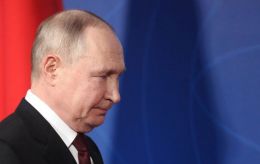Impeachment in South Korea - President removed for abuse of power
 Photo: Impeached President of South Korea Yoon Suk Yeol (Getty Images)
Photo: Impeached President of South Korea Yoon Suk Yeol (Getty Images)
After a four-month political crisis, South Korea is heading toward new elections - President Yoon Suk Yeol has been removed from office by a court ruling, according to Yonhap News.
Acting Chief Justice Moon Hyung-bae read the verdict, which took immediate effect. The ruling requires the country to hold early presidential elections to select Yoon's successor within 60 days, which, many expect, will take place on June 3.
"The negative effects on the constitutional order and the repercussions from the defendant's violations of the law are grave, making the benefits of protecting the Constitution by dismissing the defendant overwhelmingly larger than the national losses from dismissing the president," Moon said.
This decision concluded a four-month saga that began with Yoon's unexpected declaration of martial law, his arrest, and subsequent release, causing significant damage to the country’s political, economic, and social structure.
In a statement released by his legal team, Yoon apologized to the people for failing to meet their expectations and thanked them for their support.
"My beloved people, it was a great honor to be able to work for the Republic of Korea," he said. "I will always pray for my beloved Republic of Korea and all of you.".
Later that day, Yoon met at the presidential residence with the acting leader of the ruling People’s Power Party (PPP) Kwon Young-se and the leader of the PPP faction Kwon Song-dong.
During the meeting, Yoon thanked his supporters and wished the country prosperity despite leaving his post.
He also expressed hope that the ruling party would prepare well for the upcoming presidential elections and would surely win.
Accusations in Court
The essence of the case was whether Yoon violated the law by committing five key actions: declaring martial law, issuing a martial law decree, deploying troops to the National Assembly, attacking the National Election Commission, and attempting to arrest politicians.
The court upheld all accusations, including that he did not comply with the legal requirements for declaring martial law. According to the Constitution, the president can declare martial law during wartime or in a similar national emergency.
Yoon justified his actions by blaming the main opposition party for paralyzing state affairs with their repeated impeachments of his administration's officials and attempts to cut the state budget.
The court rejected his argument.
"By damaging the authority of a constitutional institution and violating the people's basic human rights through the mobilization of troops and the police, he neglected his duty to protect the Constitution," Moon said.
"The defendant's actions in violation of the Constitution and laws are a betrayal of the people's trust, and from the perspective of protecting the Constitution, a grave violation of the law that cannot be tolerated," he added.
To support the impeachment proposal, at least six judges' consent was required, and currently, there are eight judges on the bench.
The key issue was not only whether Yoon violated the law but whether the violation was serious enough to justify his removal.
The removed leader did not appear in court for the verdict.
From the day the impeachment motion was filed against Yoon on December 14, 111 days passed. After the last hearing, it took the court 38 days to deliver its verdict.
Next steps - Elections
In an address to the nation, Acting President and Prime Minister Han Duck-soo promised to do everything possible to conduct the upcoming elections and ensure a smooth transition to the next administration.
The ruling People’s Power Party stated that it "humbly accepts" the court’s decision, while the main opposition Democratic Party (DP) welcomed it as a "people's victory."
DP leader Lee Jae-myung, who is considered a favorite in the upcoming presidential elections, issued a separate statement in the National Assembly.
"The great people recovered the great democratic republic, the Republic of Korea," he said. "Together with the people, we will restore the destroyed people's livelihoods, peace, economy and democracy with a spirit of grand unity."
The President’s case
In December 2024, President Yoon Suk Yeol declared martial law in the country.
The reason for the decision was an attempt to eliminate the opposition parties' dominance in Parliament, particularly the Democratic Party. According to Yoon, the party showed loyalty to North Korea, blocked government work, and harmed national interests.
The government and Parliament refused to support the martial law and demanded that Yoon cancel it. The regime lasted about 6 hours, but it marked the beginning of a political crisis in the country.
After the incident, criminal charges were filed against Yoon, and he was removed from the presidency.
In mid-December, the opposition-controlled National Assembly declared his impeachment. He was accused of violating the Constitution and laws by declaring martial law on December 3, deploying troops to the National Assembly to prevent lawmakers from voting on the decree, and issuing an arrest order for politicians.
In addition to the impeachment process, Yoon is also facing a criminal case for inciting rebellion due to his proposal to declare martial law, which carries a maximum punishment of life imprisonment or the death penalty.

